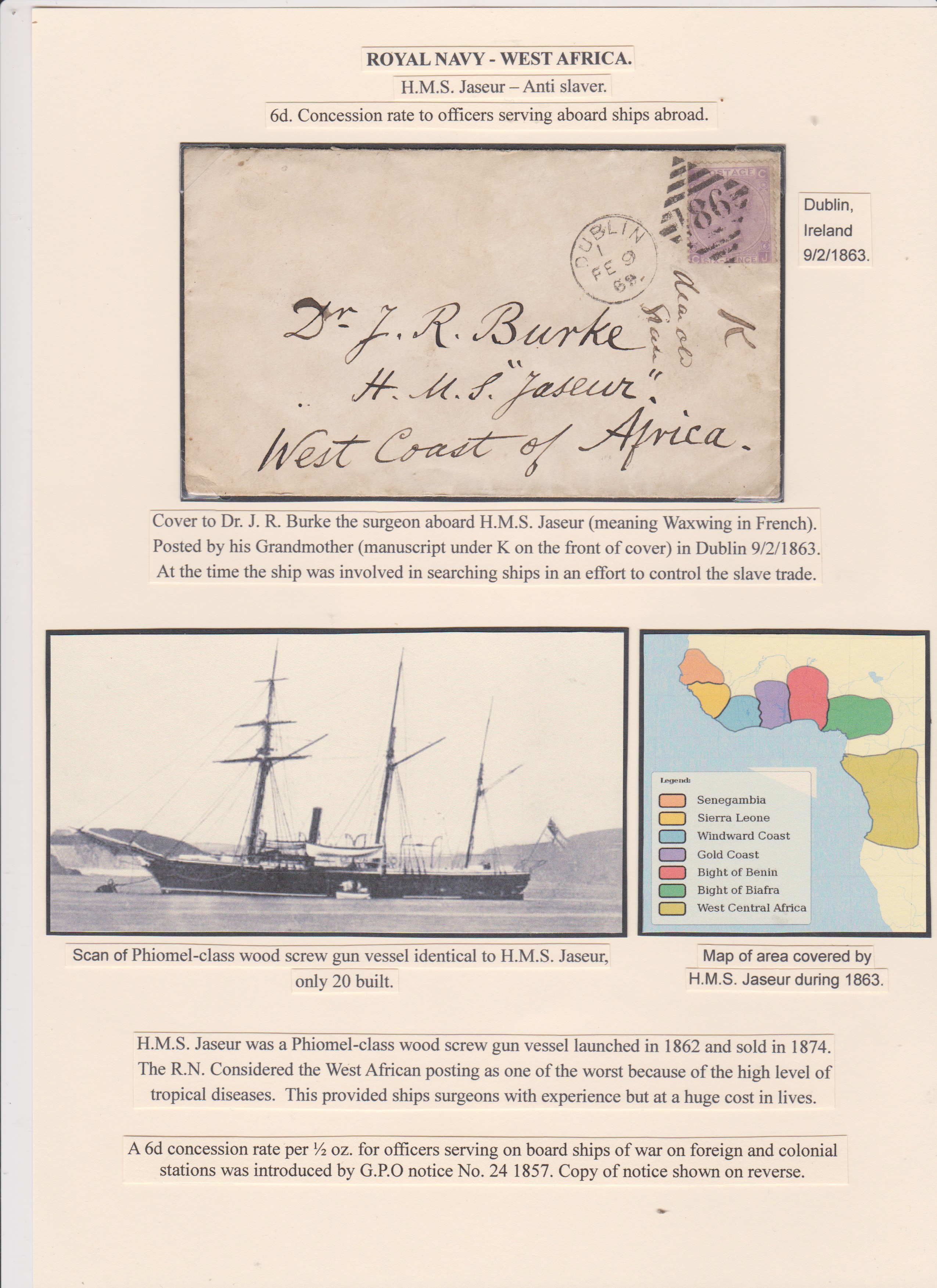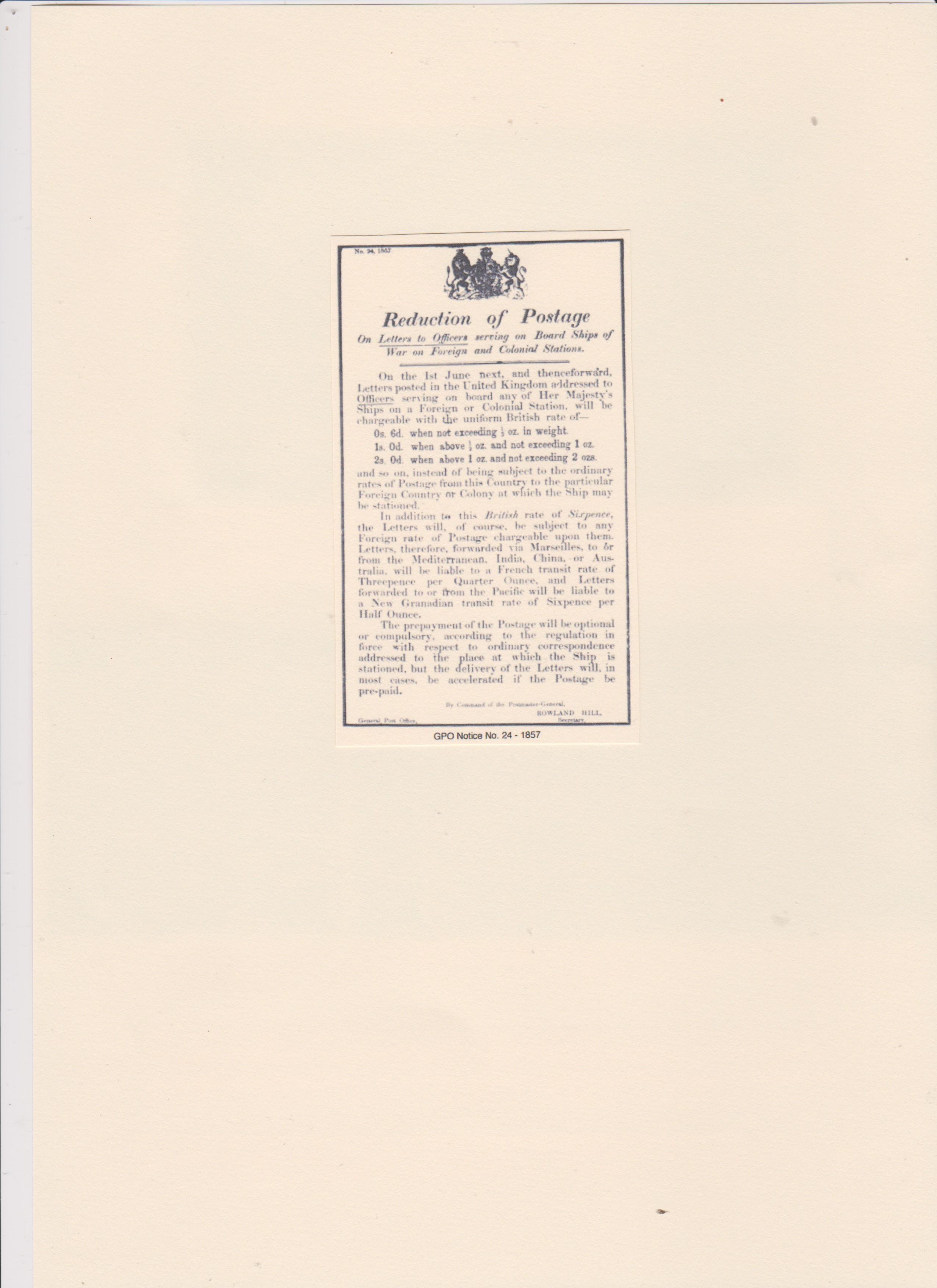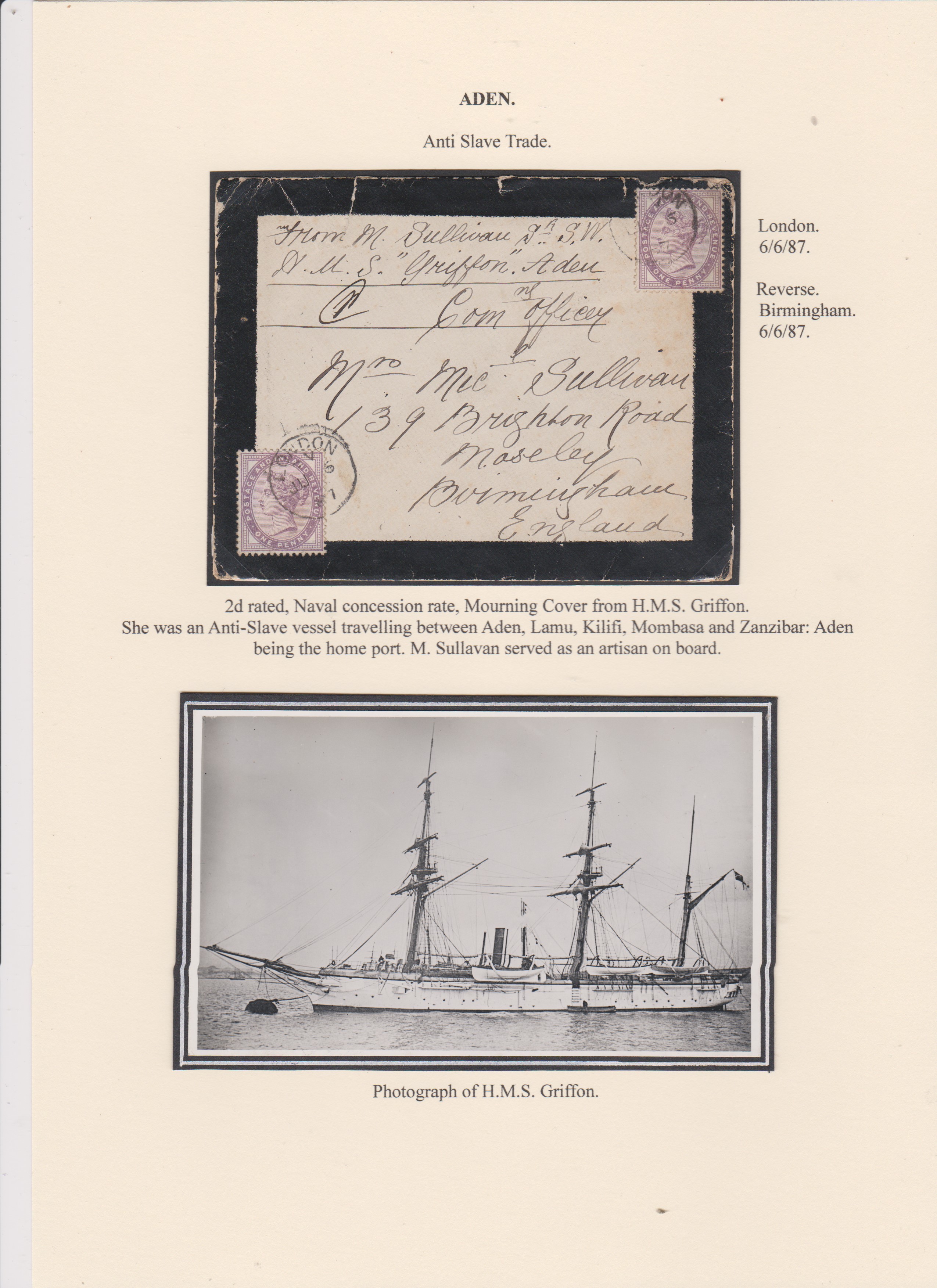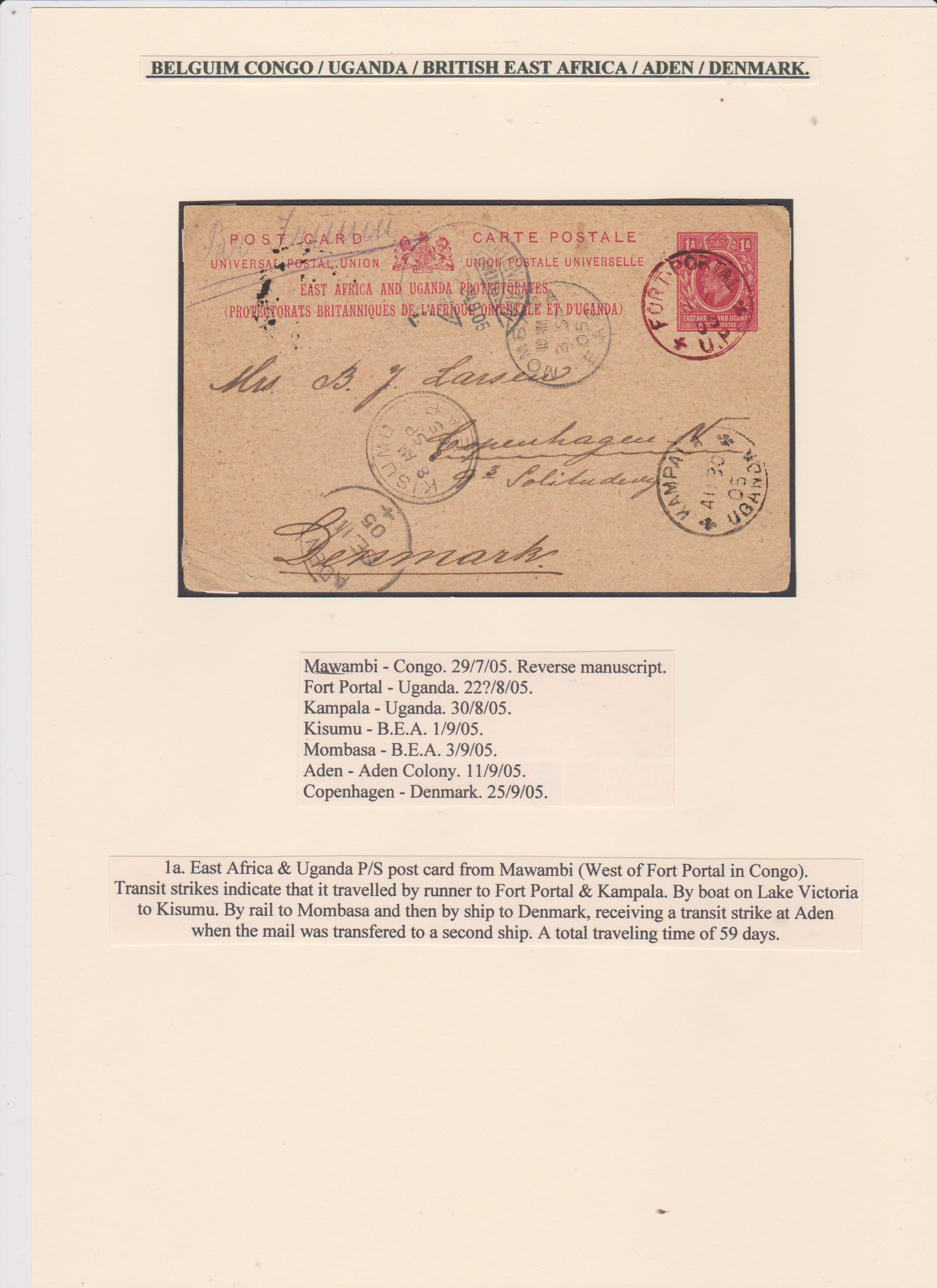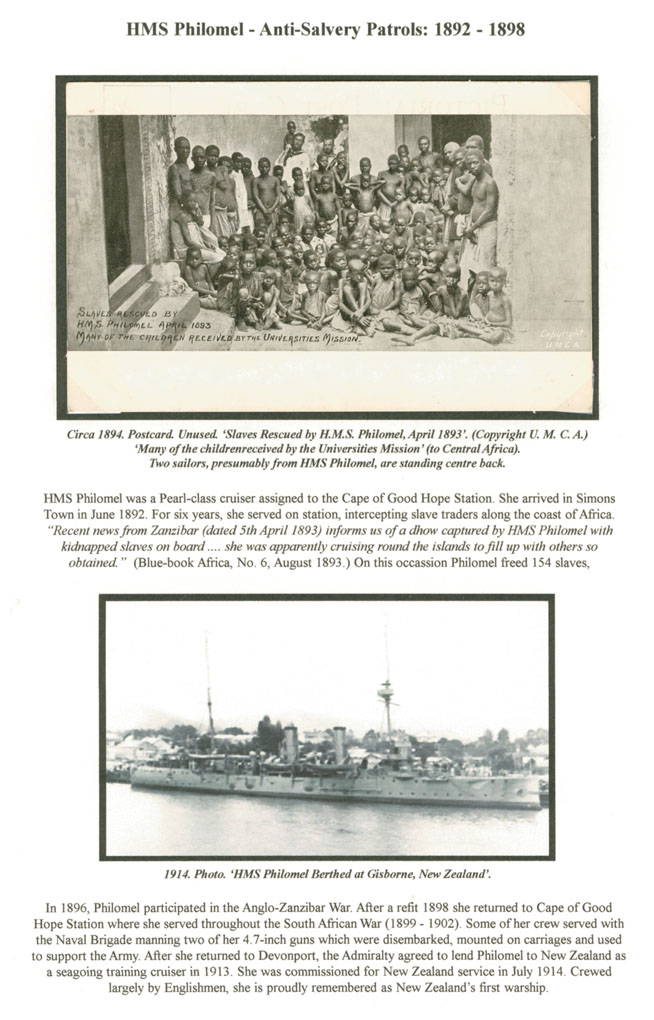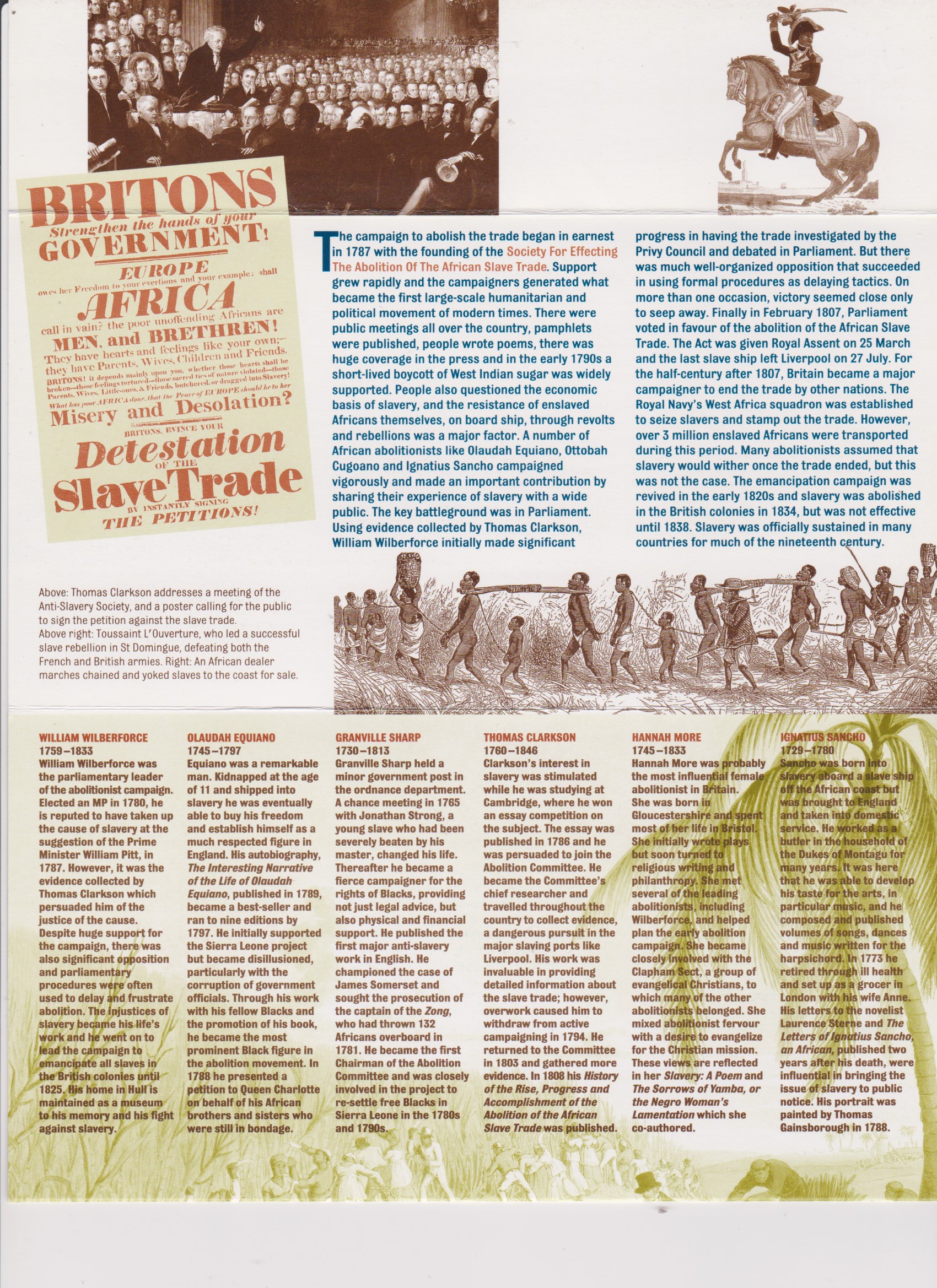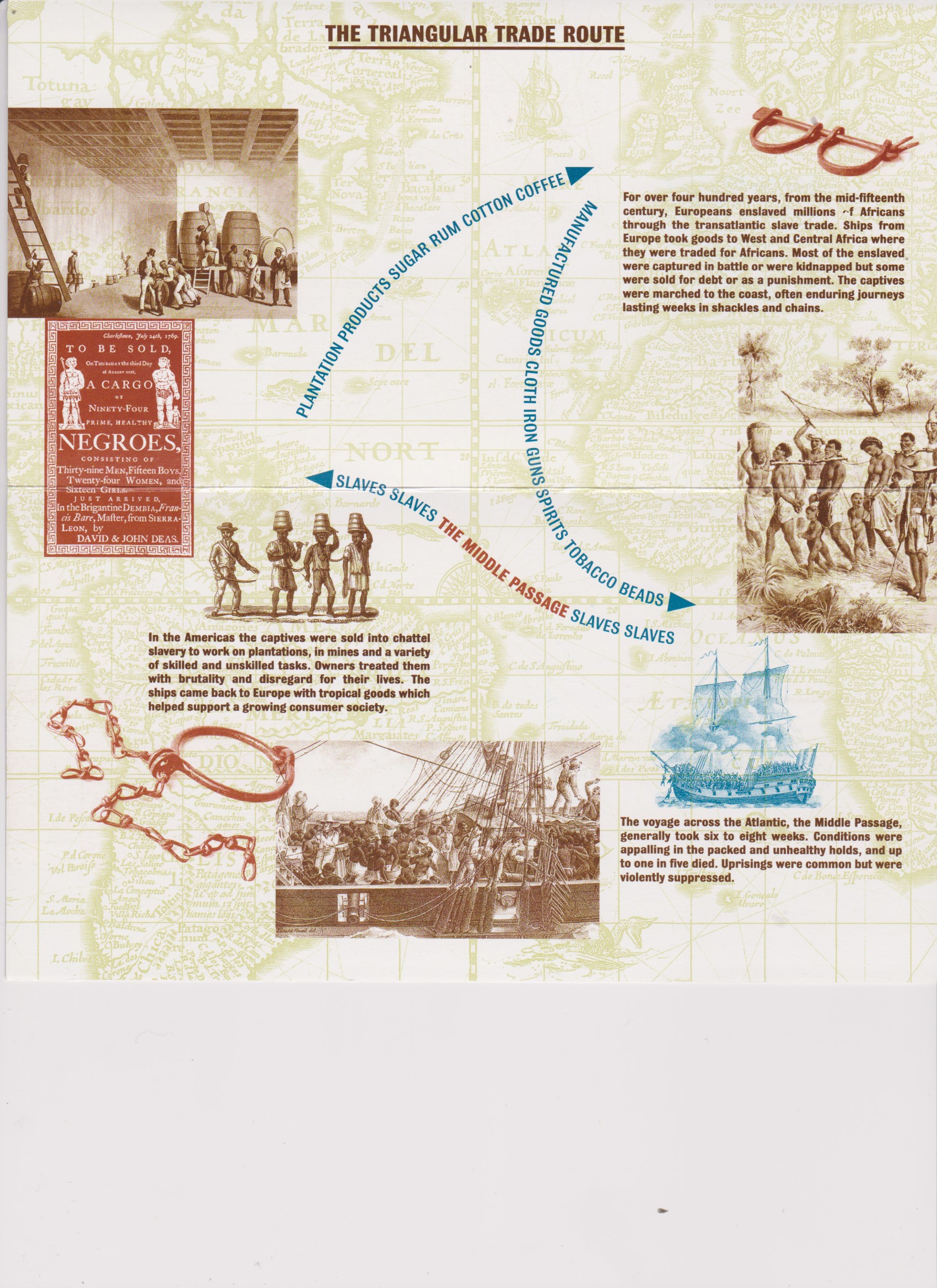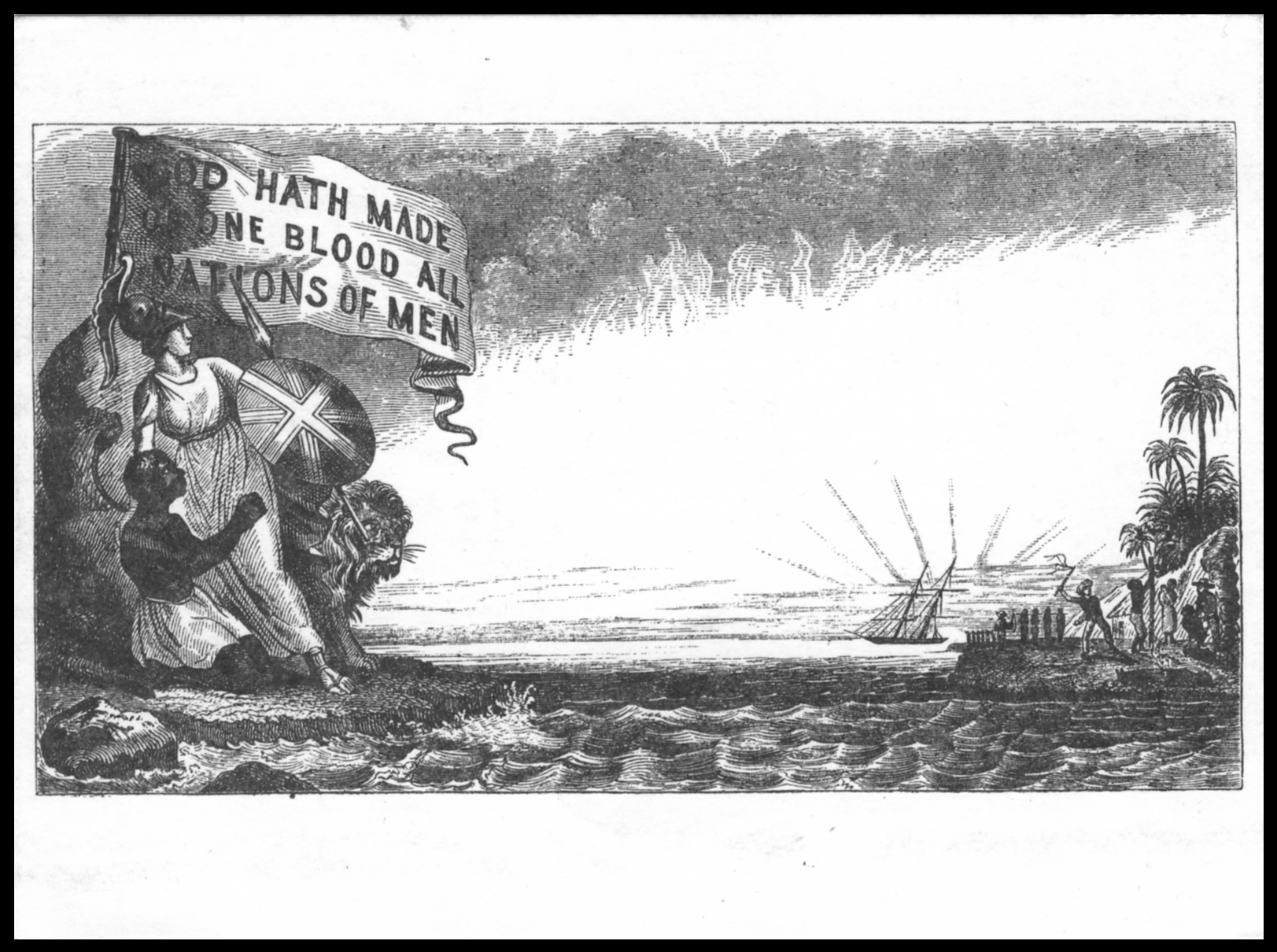Anti-Slave Trade Patrols.
Quote from Jamie Smith on July 22, 2020, 9:08 pmFollowing the recent talk given to the Royal Philatelic Society by Patrick Maselis RDP FRPSL and the renewed interest in 'Old Africa', I thought I would show three relevant items from my collection. In his talk Patrick Maselis mentioned the slave trade which had been taking place in West and East Africa over too many years. Great Britain gets a lot of the blame for these activities but perhaps not enough credit for her efforts to stop the trading in human bodies. Here I show two covers from British Gun-boats one from West Africa and one from East Africa, both ships were involved in the British effort to stop that trade. I also show a post card from the Congo which I know is the area of Patrick's interest.
Following the recent talk given to the Royal Philatelic Society by Patrick Maselis RDP FRPSL and the renewed interest in 'Old Africa', I thought I would show three relevant items from my collection. In his talk Patrick Maselis mentioned the slave trade which had been taking place in West and East Africa over too many years. Great Britain gets a lot of the blame for these activities but perhaps not enough credit for her efforts to stop the trading in human bodies. Here I show two covers from British Gun-boats one from West Africa and one from East Africa, both ships were involved in the British effort to stop that trade. I also show a post card from the Congo which I know is the area of Patrick's interest.
Uploaded files:
Quote from Steve on July 23, 2020, 11:54 amA very interesting post at a very relevant time. Thanks Jamie.
You are quite right that Britain did a lot, much more than most civilised countries, to stamp out slavery after it was abolished it in 1833, (France 1848, USA 1865). Slavery is an economic system where the main cost of production is the purchase of the worker. It is interesting to note that while the Netherlands signed an international agreement to stop the slave trade in 1814, it was not until 1863 that slavery was officially abolished in the main Dutch South American slave colony of Surinam. It was the actions of the Royal Navy that stopped slavery on Surinam plantations, not Dutch moral outrage. Because Royal Navy patrols prevented new slaves replacing those who had died, someone had to be paid to do the work of slaves. The Royal Navy's actions made slavery as an economic system untenable.
The East African Slave Trade
I attach a sheet from my Simonstown display which shows HMS Philomel which ran anti-slavery patrols out of the Cape of Good Hope station in the 1890s. The postcard shows children rescued on route to a life of slavery in the Arabian Peninsula in 1894. There are many who want us to forget the huge East African / Arabian slave trade while rubbing our noses in the stink of the North Atlantic one. Many of these moralising moaners are Muslim evangelisers who tell the hopeless of our inner-cities that slavery is the root cause of their social and economic degredation, that their miserable lives are the fault of racist White men.
As a White South African male who did not use the word 'Kaffir', (Arabic. infidel / non-believer), I am intrigued how a Koranic word came into Portuguese use, was passed on to the Dutch and finally to the British. The Politically Correct tell us that Islam allows slavery subject to fair treatment. Also, a Moslem cannot be made a slave by another Moslem. This means that anyone who is not a believer in the Islamic faith ie. who is an infidel / Kaffir, was fair game for marauding bands of East African slavers. I imagine that when the first Portuguese arrived in the Indian Ocean, the impressive size of this huge trade in the 'Kaffir' commodity made the word especially memorable.
Zanzibar, an island off the East African coast, was probably the largest slave port in the Indian Ocean. Its trade in 'Kaffirs' was dominated by Arab slave traders with links to the Royal House of Oman, Zanzibar being one of its overseas possesions until 1858 when it became independent. In 1822, the British signed the first of a series of treaties with Sultan Said of Zanzibar to curb this trade but it was not until 1876 that the slaves trade was finally prohibited under strong British pressure. With Islam allowing slavery under certain conditions, the British had to tread gingerly lest the British Empire incur the hatred of the Islamic world. Britain had to take into account the 'sensitvities' of the islands Moslem rulers and their 'righteous' religious and cultural beliefs and practices. As a result, slavery remained legal in Zanzibar until 1897. It would continue in remote parts of the Arabian peninsula until the late 20th C.
A very interesting post at a very relevant time. Thanks Jamie.
You are quite right that Britain did a lot, much more than most civilised countries, to stamp out slavery after it was abolished it in 1833, (France 1848, USA 1865). Slavery is an economic system where the main cost of production is the purchase of the worker. It is interesting to note that while the Netherlands signed an international agreement to stop the slave trade in 1814, it was not until 1863 that slavery was officially abolished in the main Dutch South American slave colony of Surinam. It was the actions of the Royal Navy that stopped slavery on Surinam plantations, not Dutch moral outrage. Because Royal Navy patrols prevented new slaves replacing those who had died, someone had to be paid to do the work of slaves. The Royal Navy's actions made slavery as an economic system untenable.
The East African Slave Trade
I attach a sheet from my Simonstown display which shows HMS Philomel which ran anti-slavery patrols out of the Cape of Good Hope station in the 1890s. The postcard shows children rescued on route to a life of slavery in the Arabian Peninsula in 1894. There are many who want us to forget the huge East African / Arabian slave trade while rubbing our noses in the stink of the North Atlantic one. Many of these moralising moaners are Muslim evangelisers who tell the hopeless of our inner-cities that slavery is the root cause of their social and economic degredation, that their miserable lives are the fault of racist White men.
As a White South African male who did not use the word 'Kaffir', (Arabic. infidel / non-believer), I am intrigued how a Koranic word came into Portuguese use, was passed on to the Dutch and finally to the British. The Politically Correct tell us that Islam allows slavery subject to fair treatment. Also, a Moslem cannot be made a slave by another Moslem. This means that anyone who is not a believer in the Islamic faith ie. who is an infidel / Kaffir, was fair game for marauding bands of East African slavers. I imagine that when the first Portuguese arrived in the Indian Ocean, the impressive size of this huge trade in the 'Kaffir' commodity made the word especially memorable.
Zanzibar, an island off the East African coast, was probably the largest slave port in the Indian Ocean. Its trade in 'Kaffirs' was dominated by Arab slave traders with links to the Royal House of Oman, Zanzibar being one of its overseas possesions until 1858 when it became independent. In 1822, the British signed the first of a series of treaties with Sultan Said of Zanzibar to curb this trade but it was not until 1876 that the slaves trade was finally prohibited under strong British pressure. With Islam allowing slavery under certain conditions, the British had to tread gingerly lest the British Empire incur the hatred of the Islamic world. Britain had to take into account the 'sensitvities' of the islands Moslem rulers and their 'righteous' religious and cultural beliefs and practices. As a result, slavery remained legal in Zanzibar until 1897. It would continue in remote parts of the Arabian peninsula until the late 20th C.
Uploaded files:Quote from Jamie Smith on July 23, 2020, 2:23 pmSteve, thanks for information. Just for information sake I was stationed in Kenya 1960-63 with the Royal Air Force and the information circulating then was that the trade was still carried on with 'slaves' being put into a 'female' cabin which was a small space on the dhow deck into which no non-believer could enter, this of course included search parties. this was later confirmed when I mentioned the local information to an ex-Kenya Police officer AND another gentleman from Baghdad.
Steve, thanks for information. Just for information sake I was stationed in Kenya 1960-63 with the Royal Air Force and the information circulating then was that the trade was still carried on with 'slaves' being put into a 'female' cabin which was a small space on the dhow deck into which no non-believer could enter, this of course included search parties. this was later confirmed when I mentioned the local information to an ex-Kenya Police officer AND another gentleman from Baghdad.
Quote from Steve on July 27, 2020, 10:56 amWhile we are on the subject, take a look at this BBC article. This link on slavery is a surprising and welcome change, an admission that suggests Black people were complicit in the slave trade which almost certainly existed before White men stepped ashore in West Africa. Slavery was an ancient African practice. Egypt was an African civilisation whose slaves built the Pyramids and more. Nubia and or the Southern Sudan was rich source of slaves long before Arab traders went there to collect the 'Kaffir' commodity. Knowledge of slavery would have reached West Africa long before the European voyages of discovery. Slavery would have existed in West Africa at least since the Islamic conquest of its northern reaches. Slavery existed in East Africa before the Portuguese got there. It was not a case of Whites creating the Demand for slaves - it was a case of the Supply being readily available. More credit to the British then for finally having the moral strength to abolish slavery in the face of vested 'way of life' African commercial interests.
If this link, ceases to work for whatever reason, please email to advise of its discontinuation.
https://www.bbc.co.uk/news/world-africa-53444752?utm_source=pocket-newtab-global-en-GB
While we are on the subject, take a look at this BBC article. This link on slavery is a surprising and welcome change, an admission that suggests Black people were complicit in the slave trade which almost certainly existed before White men stepped ashore in West Africa. Slavery was an ancient African practice. Egypt was an African civilisation whose slaves built the Pyramids and more. Nubia and or the Southern Sudan was rich source of slaves long before Arab traders went there to collect the 'Kaffir' commodity. Knowledge of slavery would have reached West Africa long before the European voyages of discovery. Slavery would have existed in West Africa at least since the Islamic conquest of its northern reaches. Slavery existed in East Africa before the Portuguese got there. It was not a case of Whites creating the Demand for slaves - it was a case of the Supply being readily available. More credit to the British then for finally having the moral strength to abolish slavery in the face of vested 'way of life' African commercial interests.
If this link, ceases to work for whatever reason, please email to advise of its discontinuation.
https://www.bbc.co.uk/news/world-africa-53444752?utm_source=pocket-newtab-global-en-GB
Quote from Jamie Smith on July 27, 2020, 11:03 amThe truth will out!
The truth will out!
Quote from Jamie Smith on July 29, 2020, 1:34 pmFollowing my post on SAPC I received this in the post as a stiffener for a postal history item. It is a Royal Mail addition to G.B. stamps that were issued (I have no idea when) but sadly the stamps were missing. On the other hand interesting reading but no mention of the East African Slave Trade - would that be because it would be 'politically incorrect' to mention it?
Following my post on SAPC I received this in the post as a stiffener for a postal history item. It is a Royal Mail addition to G.B. stamps that were issued (I have no idea when) but sadly the stamps were missing. On the other hand interesting reading but no mention of the East African Slave Trade - would that be because it would be 'politically incorrect' to mention it?
Uploaded files:Quote from Steve on October 22, 2022, 11:45 amYes, it is undoubtedly politically incorrect to blame anyone other than ourselves for slavery. I accept that Britain was complicit in the slave trade but we were not alone. Many European nations had practised slavery and to their credit had recognised and accepted that it was wrong, a crime against humanity, before Britain did. The most stubborn of the slavers were the Portuguese who shipped millions of Africans from Angola and West Africa to Brazil. (The first public sale of African slaves in Portugal took place in 1444. Brazil only ended slavery in 1888.) However, when Britain decided to end slavery, (society's opinion on this was divided), it determined to stamp out the practice wherever it found it.
The second lower sheet is interesting for what it doesn't say but rather obliquely hints at. For example, it shows manufactured goods, cloth, iron, beads, guns, alcohol, etc., flowing from Britain and or Europe to West Africa. These trade goods were of little value to Europeans but greatly attractive to Africans who did not have them, specifically the local chieftains who made war on their neighbours in order to acquire captives for the purposes of exchanging them for trade goods. The slave trade would not have existed without the support of these powerful local African chieftains; equally, the slave trade could not have existed without the colonial world's demand for slaves. Importantly, the images show African people, not Europeans, whipping the shackled slaves along a bitter trail of tears. This is not to blame Africans for slavery nor excuse to Europeans from it. It is simply what the images show.
Below is a modern postcard (Stamp Collecting magazine, 1980) showing an unaddressed envelope inspired by Mulready postal stationery. These were used "for various campaigns for propaganda: Temperance, Anti-Slavery, Peace, Colonisation and the 1851 Exhibition". Designed and engraved by Valetine's of Dundee for the Anti-Slavery campaign, this postcard states 'God hath made of one blood all nations of men'. In this image a slave ship has arrived at its tropical destination where a European is whipping an African man tied to a stake. I have absolutely no doubt this happened often as shown. Sadly, however, too many people seem to want to only see White men whipping Blacks rather than the full picture where Blacks whip Blacks to get them to the slave market on the fatal African shore.
Yes, it is undoubtedly politically incorrect to blame anyone other than ourselves for slavery. I accept that Britain was complicit in the slave trade but we were not alone. Many European nations had practised slavery and to their credit had recognised and accepted that it was wrong, a crime against humanity, before Britain did. The most stubborn of the slavers were the Portuguese who shipped millions of Africans from Angola and West Africa to Brazil. (The first public sale of African slaves in Portugal took place in 1444. Brazil only ended slavery in 1888.) However, when Britain decided to end slavery, (society's opinion on this was divided), it determined to stamp out the practice wherever it found it.
The second lower sheet is interesting for what it doesn't say but rather obliquely hints at. For example, it shows manufactured goods, cloth, iron, beads, guns, alcohol, etc., flowing from Britain and or Europe to West Africa. These trade goods were of little value to Europeans but greatly attractive to Africans who did not have them, specifically the local chieftains who made war on their neighbours in order to acquire captives for the purposes of exchanging them for trade goods. The slave trade would not have existed without the support of these powerful local African chieftains; equally, the slave trade could not have existed without the colonial world's demand for slaves. Importantly, the images show African people, not Europeans, whipping the shackled slaves along a bitter trail of tears. This is not to blame Africans for slavery nor excuse to Europeans from it. It is simply what the images show.
Below is a modern postcard (Stamp Collecting magazine, 1980) showing an unaddressed envelope inspired by Mulready postal stationery. These were used "for various campaigns for propaganda: Temperance, Anti-Slavery, Peace, Colonisation and the 1851 Exhibition". Designed and engraved by Valetine's of Dundee for the Anti-Slavery campaign, this postcard states 'God hath made of one blood all nations of men'. In this image a slave ship has arrived at its tropical destination where a European is whipping an African man tied to a stake. I have absolutely no doubt this happened often as shown. Sadly, however, too many people seem to want to only see White men whipping Blacks rather than the full picture where Blacks whip Blacks to get them to the slave market on the fatal African shore.
Uploaded files:Quote from Jamie Smith on October 22, 2022, 6:25 pmIf you are going to talk about slavery, please put it into perspective. It wasn't just Africans and Europeans who were involved!!! There was a slave trade on the East Coast of Africa as well which is rarely mentioned because of political correctness? It was run from the Middle East and Zanzibar using Arab Dhows and it was the British who tried to stop it. I say tried because when I was stationed in Kenya in the early 1960's it was still going on!!!!!!! There is a portion of an Arab Dhow where no outsider is allowed to enter so the police were not allowed to search there!
If you are going to talk about slavery, please put it into perspective. It wasn't just Africans and Europeans who were involved!!! There was a slave trade on the East Coast of Africa as well which is rarely mentioned because of political correctness? It was run from the Middle East and Zanzibar using Arab Dhows and it was the British who tried to stop it. I say tried because when I was stationed in Kenya in the early 1960's it was still going on!!!!!!! There is a portion of an Arab Dhow where no outsider is allowed to enter so the police were not allowed to search there!

